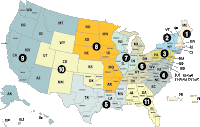Yesterday, the Florida Supreme Court accepted jurisdiction, without oral argument, in Cooper v. State of Florida (SC09-1169). The order accepting jurisdiction can be viewed HERE. The Petitioner's Brief on Jurisdiction can be viewed HERE and the Respondent's Brief on Jurisdiction can be viewed HERE. The opinion under review was released by the Second District on June 10, 2009 and can be viewed HERE. The Petitioner's summary of argument from its brief on jurisdiction is below:
In Cooper, the Second District Court of Appeal stated: “Because the taped statement is strong evidence of Cooper's guilt, we conclude that the error of allowing the State to present evidence of multiple sexual acts did not affect the verdict and was harmless in this case. See State v. DiGuilio, 491 So.2d 1129 (Fla. 1986).”
This conflicts with the standard for harmless error analysis required by DiGuilio, Knowles v. State, 848 So. 2d 1055 (Fla. 2003), and State v. Lee, 531 So. 2d 133 (Fla. 1988), which rejects weighing of the evidence and focuses the analysis to examine the effect of the error on the trier of fact to hold that an error is harmful unless it is shown beyond a reasonable doubt that the verdict was not affected.Later, the Petitioner stated:
The Second District found the admission of numerous erroneously admitted uncharged acts of sexual misconduct without proper notice to be harmless error by applying the wrong standard for harmless error analysis.



0 comments:
Post a Comment